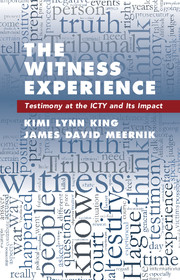Book contents
- Frontmatter
- Contents
- List of Figures page
- List of Tables
- Acknowledgments
- 1 Introduction to the Survey and Survey Methodology
- 2 Exploring the Gender, Ethnicity, and Trauma Characteristics of the Witness Sample
- 3 The Witnesses and Their Encounter with International Justice
- 4 The Witnesses and Human Security: The Social, Economic, and Security Consequences of Testimony
- 5 The Impact of Testifying
- 6 Perceptions of Justice
- 7 Conclusions
- Bibliography
- Index
1 - Introduction to the Survey and Survey Methodology
Published online by Cambridge University Press: 11 November 2017
- Frontmatter
- Contents
- List of Figures page
- List of Tables
- Acknowledgments
- 1 Introduction to the Survey and Survey Methodology
- 2 Exploring the Gender, Ethnicity, and Trauma Characteristics of the Witness Sample
- 3 The Witnesses and Their Encounter with International Justice
- 4 The Witnesses and Human Security: The Social, Economic, and Security Consequences of Testimony
- 5 The Impact of Testifying
- 6 Perceptions of Justice
- 7 Conclusions
- Bibliography
- Index
Summary
INTRODUCTION
This was never going to be an ordinary survey project. Surveying individuals who have experienced the horrors of war and lived to tell their story to an international tribunal is no easy undertaking. Yet such compelling research is necessary if we are to understand fully the “justice cascade” and how transitional justice mechanisms can be used to hold accountable those who have violated human rights (Sikkink 2011). While great strides have been made in developing the rule of law and international legal institutions to discourage governments and rebels from violating humanitarian laws and human rights, there is an intensely personal component to the judicial proceedings that can often be overlooked. The witnesses – whose experiences are the foundation of a tribunal's search for truth – are vital for exonerating or convicting the accused, and their testimony helps establish the historical record. They are the indispensable stakeholders for whom the core mission of the International Criminal Tribunal for the Former Yugoslavia (ICTY) is to ensure that equity and fairness are applied throughout the testimonial process. And as critical and as difficult as the testimonial process is, the witness experience does not end with the court's final judgment. The witnesses go back to their lives and face the consequences of returning home to shattered communities after testifying. What paths and pain take the witnesses from war and its aftermath to the rarified courtrooms of an international tribunal? How do the witnesses’ experiences and perceptions in the post-testimonial phase help us better understand and develop justice systems that ensure justice is done? How can we better gauge the short-term and long-term impacts on witnesses who testify? And most especially, how can legal institutions ensure that these individuals are not re-traumatized by the process and protect those who have come forward from backlash within their communities? Our most fundamental purpose of this unique survey was to examine more fully the witness experience by exploring these and other questions through an in-depth survey and short interview with a cross-section of witnesses who have testified before the ICTY.
- Type
- Chapter
- Information
- The Witness ExperienceTestimony at the ICTY and Its Impact, pp. 1 - 36Publisher: Cambridge University PressPrint publication year: 2017



